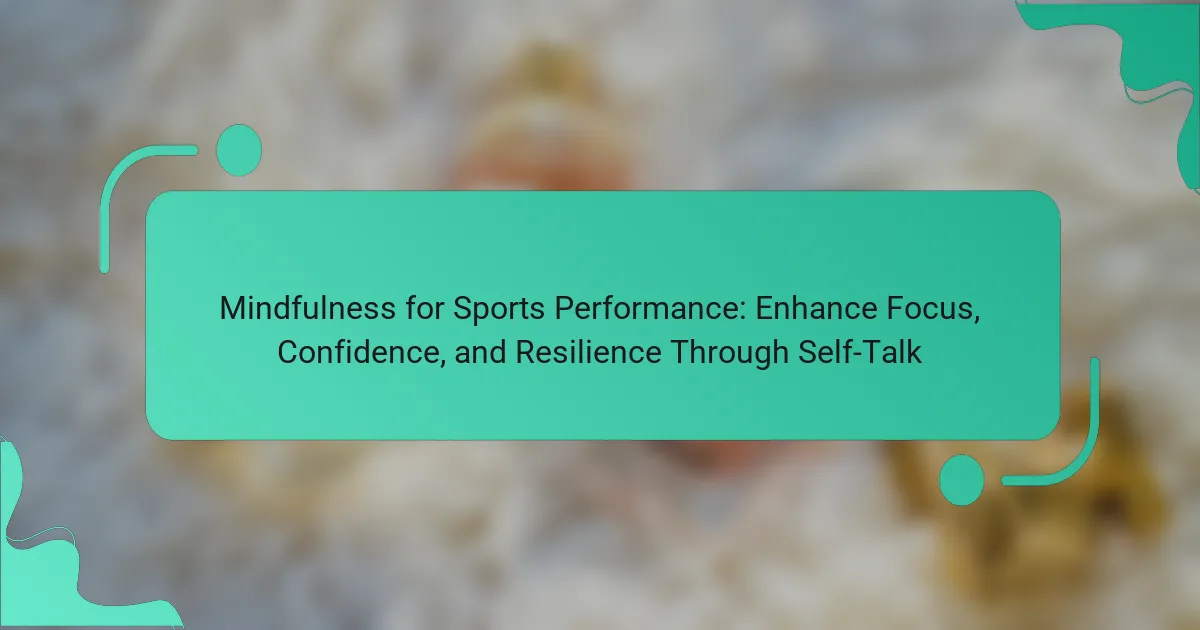Mindfulness enhances sports performance by improving focus, confidence, and resilience through effective self-talk. Positive self-talk increases motivation and reduces anxiety, leading to better outcomes in competitions. Mindfulness techniques, such as focused breathing and visualization, help athletes concentrate and prepare mentally. Tailoring self-talk strategies to individual sports can further boost performance and mental toughness.

How Does Self-Talk Influence Athletic Performance?
Self-talk significantly enhances athletic performance by improving focus, confidence, and resilience. Positive self-talk increases motivation and reduces anxiety, leading to better outcomes during competitions. Research shows that athletes who engage in constructive self-talk experience heightened concentration and a stronger sense of control, which are crucial during high-pressure situations. Additionally, self-talk can act as a mental rehearsal tool, helping athletes visualize success and prepare mentally for their performance.
What Are the Key Components of Effective Self-Talk?
Effective self-talk in sports performance involves positive affirmations, realistic goal-setting, and mindfulness techniques. These components enhance focus, build confidence, and foster resilience. Positive affirmations help athletes maintain a constructive mindset, while realistic goals provide a clear direction. Mindfulness techniques, such as breath control and present-moment awareness, further improve mental clarity and performance. Together, these elements create a robust framework for athletes to optimize their mental game and achieve peak performance.
How Can Athletes Identify Negative Self-Talk Patterns?
Athletes can identify negative self-talk patterns by monitoring their thoughts during training and competition. Journaling these thoughts helps reveal recurring themes and triggers.
Recognizing specific phrases or beliefs that arise in challenging situations is crucial. For instance, phrases like “I can’t do this” or “I’m not good enough” indicate negative self-talk.
Mindfulness techniques, such as meditation, can enhance awareness of these patterns. Regular practice allows athletes to observe their thoughts without judgment, fostering a more positive mindset.
Seeking feedback from coaches or peers can also provide insights into self-talk habits. Constructive discussions can highlight negative patterns that athletes may overlook.
What Techniques Can Transform Negative Self-Talk into Positive Dialogue?
To transform negative self-talk into positive dialogue, practice mindfulness techniques such as awareness, reframing, and affirmations. Awareness involves recognizing negative thoughts without judgment. Reframing allows athletes to change the narrative from failure to growth opportunities. Affirmations reinforce positive beliefs, enhancing focus and confidence during performance. Regularly applying these techniques builds resilience and fosters a supportive inner dialogue.
What Role Does Inner Dialogue Play in Building Confidence?
Inner dialogue significantly enhances confidence by shaping self-perception and influencing performance. Positive self-talk fosters a growth mindset, allowing athletes to overcome challenges. Research shows that athletes who engage in constructive inner dialogue experience increased resilience and improved focus. This mental strategy not only boosts confidence but also enhances overall sports performance.
How Can Athletes Use Affirmations to Boost Self-Esteem?
Athletes can use affirmations to significantly boost self-esteem by reinforcing positive self-talk. This practice enhances focus and confidence, crucial for optimal sports performance. Regularly repeating affirmations helps athletes internalize beliefs about their abilities, fostering resilience during challenges. Research shows that athletes who engage in positive self-affirmation report increased motivation and improved performance metrics. By integrating affirmations into their training routines, athletes can cultivate a strong mental framework that supports their physical efforts.
What Strategies Enhance Resilience Through Self-Talk?
Positive self-talk enhances resilience by fostering a growth mindset and reducing performance anxiety. Strategies include reframing negative thoughts, using affirmations, and visualizing success. Reframing shifts focus from failure to opportunity, while affirmations build confidence. Visualization creates mental scenarios of success, reinforcing belief in abilities. These techniques collectively improve focus and performance under pressure.

What Are the Universal Benefits of Mindfulness in Sports?
Mindfulness enhances sports performance by improving focus, confidence, and resilience through effective self-talk. Practicing mindfulness helps athletes concentrate on the present, reducing anxiety and distractions. This mental clarity leads to better decision-making during competitions.
Research shows that athletes who engage in mindfulness techniques report increased self-confidence. They are more likely to trust their skills and abilities, which translates to improved performance under pressure.
Resilience is another critical benefit of mindfulness. Athletes develop the capacity to bounce back from setbacks, maintaining motivation and persistence. This mental toughness is essential for long-term success in sports.
Incorporating mindfulness into training routines can lead to a holistic enhancement of sports performance, making it a valuable tool for athletes at all levels.
How Does Mindfulness Improve Focus for Athletes?
Mindfulness significantly enhances focus for athletes by promoting present-moment awareness. This practice reduces distractions, allowing athletes to concentrate on their performance. As a result, mindfulness cultivates mental clarity, which is crucial during high-pressure situations. Studies show that athletes who engage in mindfulness techniques demonstrate improved focus and resilience, leading to better overall performance.
What Unique Attributes of Self-Talk Differentiate Elite Athletes?
Elite athletes distinguish themselves through unique attributes of self-talk that enhance performance. These attributes include positive affirmations, focused visualization, and resilience-oriented dialogue. Positive affirmations boost self-confidence, while focused visualization sharpens concentration on goals. Resilience-oriented dialogue helps athletes manage setbacks, fostering mental toughness. This combination of self-talk strategies contributes to superior focus, confidence, and resilience, setting elite athletes apart from their peers.
How Do Top Athletes Personalize Their Self-Talk Strategies?
Top athletes personalize their self-talk strategies by focusing on positive affirmations and visualizations. They tailor their self-talk to reinforce confidence and resilience, often using specific phrases that resonate with their individual experiences. Unique attributes such as goal-oriented language and mindfulness techniques enhance their mental focus during competitions. As a result, athletes can effectively manage stress and maintain peak performance levels.
What Rare Techniques Can Enhance Performance Through Self-Talk?
Utilizing rare techniques in self-talk can significantly enhance sports performance. Techniques such as visualization combined with affirmations, and using metaphors can improve focus and resilience. For example, envisioning success while repeating empowering phrases can strengthen mental clarity. Additionally, employing specific language patterns that evoke positive emotions can boost confidence. Integrating these methods into training routines fosters a stronger mental game, leading to improved overall performance.

How Can Athletes Implement Mindfulness Techniques in Training?
Athletes can implement mindfulness techniques by integrating focused breathing, visualization, and self-talk into their training routines. These practices enhance focus, boost confidence, and build resilience.
Focused breathing involves taking deep, intentional breaths to calm the mind and improve concentration. Visualization enables athletes to mentally rehearse their performance, fostering a positive mindset. Self-talk, particularly positive affirmations, reinforces confidence and combats negative thoughts.
Incorporating these techniques consistently can lead to improved sports performance. A study found that athletes who practiced mindfulness reported a 25% increase in focus during competitions. By prioritizing these methods, athletes can enhance their mental game significantly.
What Are Practical Steps for Integrating Self-Talk into Daily Routines?
Integrating self-talk into daily routines can enhance sports performance by improving focus, confidence, and resilience. Start by identifying specific situations where positive self-talk can be applied, such as during practice or competition.
1. Set clear intentions for your self-talk before each practice or game.
2. Use affirmations that reinforce your skills and mindset.
3. Monitor your internal dialogue throughout the day to ensure it remains positive.
4. Incorporate self-talk strategies during training to build consistency.
5. Reflect on your performance and adjust your self-talk techniques as needed.
These practical steps create a framework for athletes to consistently utilize self-talk, contributing to improved performance outcomes.
What Common Mistakes Should Athletes Avoid When Practicing Self-Talk?
Athletes should avoid negative self-talk, overgeneralization, and unrealistic expectations. These mistakes can undermine confidence and focus. Instead, practice constructive self-talk that reinforces strengths and promotes resilience. Emphasizing positive affirmations enhances performance and mental clarity.
What Expert Insights Can Help Athletes Optimize Their Inner Dialogue?
Athletes can optimize their inner dialogue by implementing mindfulness strategies that enhance focus, confidence, and resilience. Techniques such as positive self-talk, visualization, and meditation can significantly improve performance. For example, research shows that athletes who engage in structured self-talk experience increased motivation and reduced anxiety, leading to better outcomes in competition. Additionally, mindfulness practices help athletes remain present, allowing them to better manage stress and maintain concentration during high-pressure situations. By cultivating a supportive inner dialogue, athletes can foster a mental environment conducive to peak performance.

How Can Self-Talk Strategies Be Tailored for Different Sports?
Self-talk strategies can be tailored for different sports by focusing on specific performance needs. For example, in individual sports like tennis, affirmations can boost confidence during critical points. Team sports, such as basketball, may benefit from motivational phrases that enhance collective resilience.
Unique strategies include visualization techniques in sports like gymnastics, where mental imagery complements self-talk to improve focus. In endurance sports, like marathon running, self-talk can help manage fatigue by reinforcing positive beliefs about stamina and capability.
Athletes can also adapt the tone of self-talk based on their emotional state. For high-pressure situations, a commanding tone may enhance focus, while a supportive tone can foster resilience during setbacks. Tailoring these strategies to the sport and individual preferences maximizes their effectiveness.
What Are the Best Practices for Sport-Specific Self-Talk Techniques?
Effective sport-specific self-talk techniques enhance focus, confidence, and resilience. Key practices include using positive affirmations, visualizing success, and maintaining a growth mindset.
Positive affirmations reinforce self-belief. Athletes should develop personalized phrases that resonate with their goals, such as “I am strong” or “I can achieve this.”
Visualization complements self-talk by enabling athletes to mentally rehearse performances. Imagining successful outcomes builds confidence and prepares the mind for competition.
A growth mindset encourages resilience. Athletes should embrace challenges and view setbacks as opportunities for learning, fostering a positive internal dialogue that supports perseverance.
How Can Athletes Measure the Impact of Self-Talk on Performance?
Athletes can measure the impact of self-talk on performance through self-assessment, performance metrics, and psychological tools. Self-assessment involves reflecting on feelings and thoughts before, during, and after competition. Performance metrics include tracking improvements in speed, strength, or endurance. Psychological tools like questionnaires or apps can quantify self-talk patterns and their correlation with performance outcomes. For example, a study found that positive self-talk increased endurance by 15% in runners. This method allows athletes to identify effective self-talk strategies and adjust them for optimal performance.
What Resources Are Available for Athletes to Enhance Their Self-Talk?
Athletes can enhance their self-talk through various resources, including books, workshops, and apps. Books like “The Mindful Athlete” provide insights on mindfulness techniques. Workshops often focus on cognitive strategies that improve self-talk patterns. Apps designed for mindfulness training offer guided sessions to practice positive self-talk. These resources collectively foster focus, confidence, and resilience in sports performance.
